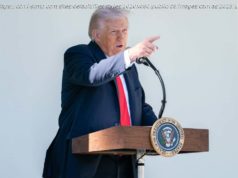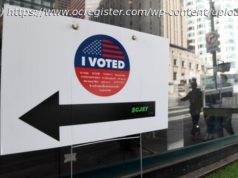A Federal Judge has dismissed a defamation lawsuit filed against the President
A Federal Judge in California has dismissed a lawsuit filed by Stephanie Clifford, who goes by the professional name Stormy Daniels, alleging that President Trump had defamed her in a series of tweets earlier this year:
A federal judge on Monday dismissed a lawsuit from adult-film actress Stormy Daniels that claimed President Trump defamed her when he suggested she had lied about being threatened to keep quiet about their alleged relationship.
U. S. District Judge S. James Otero in Los Angeles ruled that Trump’s speech was protected by the First Amendment as the kind of “rhetorical hyperbole” normally associated with politics and public discourse in the United States.” He ordered Daniels, whose given name is Stephanie Clifford, to pay Trump’s legal fees.
Trump attorney Charles Harder cheered Otero’s decision.
“No amount of spin or commentary by Stormy Daniels or her lawyer, Mr. Avenatti, can truthfully characterize today’s ruling in any way other than total victory for President Trump and total defeat for Stormy Daniels,” Harder said in an emailed statement.
The ruling is a blow for Daniels and her lawyer, Michael Avenatti, who has raised a national profile from his legal battles against the president and is contemplating a presidential bid in 2020.
Avenatti called the ruling “limited” on Twitter and said it did not affect Daniels’s primary case against Trump and his former attorney Michael Cohen, which seeks to invalidate her 2016 nondisclosure agreement.
(…)
Daniels filed the defamation claim in April after she released a sketch purporting to show the man she says threatened her in 2011 to keep quiet about the alleged affair.
Responding to the sketch on Twitter, Trump wrote that it depicted a “nonexistent man.”
“A total con job, playing the Fake News Media for Fools (but they know it)!” he wrote in the tweet, which became the basis of Daniels’s suit.
Otero, who was appointed to the court by President George W. Bush, had indicated during a late-September hearing that he was skeptical of Daniels’s claim on free-speech grounds. He said Monday that Daniels has presented herself as Trump’s “political adversary” in public and in court filings and that Trump has the right to respond to her claims.
“If this Court were to prevent Mr. Trump from engaging in this type of ‘rhetorical hyperbole’ against a political adversary, it would significantly hamper the office of the President,” Otero wrote.
“Any strongly-worded response by a president to another politician or public figure could constitute an action for defamation. This would deprive this country of the ‘discourse’ common to the political process,” he wrote.
Not surprisingly, President Trump, who seems to be spending an inordinate amount of his time today on Twitter, responded to the dismissal in typical fashion:
President Trump on Tuesday referred to the pornographic film actress Stephanie Clifford as “Horseface” in a Twitter post, as he gloated about a recent court ruling in his favor
“Federal Judge throws out Stormy Danials lawsuit versus Trump. Trump is entitled to full legal fees.” @FoxNews Great, now I can go after Horseface and her 3rd rate lawyer in the Great State of Texas. She will confirm the letter she signed! She knows nothing about me, a total con!
— Donald J. Trump (@realDonaldTrump) October 16,2018
In his tweet, Mr. Trump was referring to a federal judge’s decision to dismiss a defamation suit filed by Ms. Clifford, who is known professionally as Stormy Daniels. The judge also ordered Ms. Clifford to pay the president’s related legal fees.
The president’s use of the term “horseface” was jarring, even though he has previously used similar disparaging language to describe women who challenge him. But it could also prove problematic for Republicans facing female opponents in the upcoming midterm elections, now just weeks away.
Ms. Clifford’s attorney, Michael Avenatti, fired back on Twitter, calling the president a “disgusting misogynist and an embarrassment to the United States.”
You are a disgusting misogynist and an embarrassment to the United States. Bring everything you have, because we are going to demonstrate to the world what a complete shyster and liar you are. How many other women did you cheat on your wife with while you had a baby at home? https://t.co/npOKOEFju6
— Michael Avenatti (@MichaelAvenatti) October 16,2018
Ms. Clifford had claimed that the president defamed her last spring and attacked her credibility.
The roots of this lawsuit lie in a claim that Michael Avenatti, who is representing Daniels in connection with October 2016 agreement under which Daniels received $130,000 in exchange for her silence regarding her relationship with the President, that Daniels was threatened with physical harm to remain quiet about her relationship with Trump. Daniels provided some of the details surrounding that threat in her interview with Anderson Cooper on 60 Minutes in late March and, earlier this month, made public a composite sketch of the man she asserts threatened her in a parking lot in Los Angeles some seven years ago. Trump responded to this shortly thereafter by essentially calling Daniels a liar in a Tweet:
A sketch years later about a nonexistent man. A total con job, playing the Fake News Media for Fools (but they know it)! https://t.co/9Is7mHBFda
— Donald J. Trump (@realDonaldTrump) April 18,2018
In his ruling Judge Otero based his decision at least in part on California state laws aimed at protecting freedom of speech from being challenged by means of legal proceedings such as defamation lawsuits. Under these laws, which are generally known as anti-SLAPP, which stands for strategic lawsuits against public participation, defamation lawsuits can be dismissed if the fall within the confines of the law. While these laws vary from state-to-state they generally require the Defendant in such a lawsuit to show that they were speaking out against a public individual regarding an issue of concern to the public. If this can be established, then the burden shifts to the Plaintiff in the defamation lawsuit to show that they can make out a case of defamation based on the facts alleged.
In his ruling Judge Otero, who was appointed by George W. Bush, found that the tweet in question involved a public official and a matter of public concern. This is a somewhat questionable finding in that it is hard to determine from the opinion if the Judge is saying that the standard is met because the President is a public individual or that Clifford/Daniels is a public individual. It’s also unclear that the affair between Daniels and Trump, and the facts surrounding it are a matter of public concern. This could be an issue on appeal, an option which Michael Avenatti has already said his client will be pursuing.
In any event, having found for the Defendant on that part of the test, the question then shifted to whether or not Clifford had put forward a case of defamation based on the facts alleged. Once again, Otero found in favor of the President, finding that the statement Trump had made in his tweet was a matter of opinion rather than a statement of fact. As a general rule, of course, opinions cannot form the basis for a defamation lawsuit but it seems to me that one can at least make a credible case that what the President said in the underlying tweet was more than just an opinion, but rather an assertion of fact that Daniels was lying about having been threatened regarding her relationship with Trump.
Home
United States
USA — Political Federal Judge Dismisses Stormy Daniels Defamation Suit Against Trump






